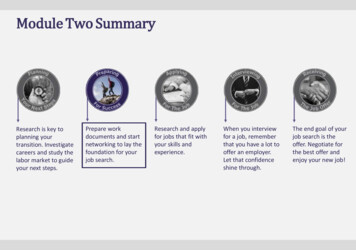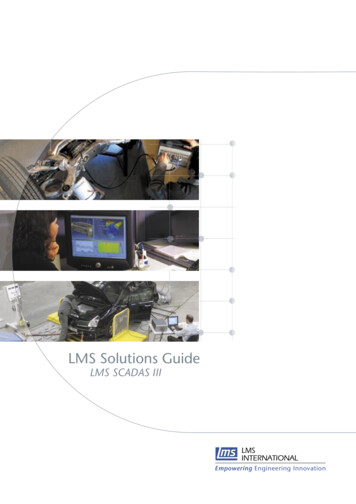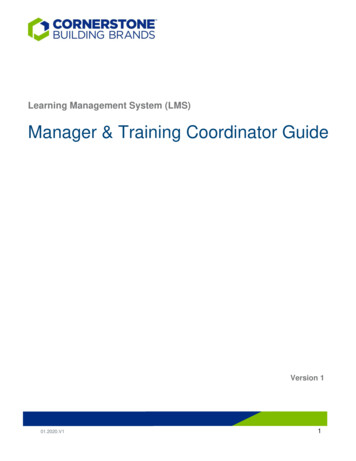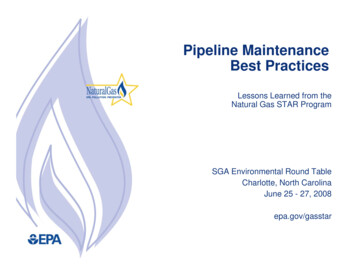
Transcription
Module Two SummaryResearch is key toplanning yourtransition. Investigatecareers and study thelabor market to guideyour next steps.Prepare workdocuments and startnetworking to lay thefoundation for yourjob search.Research and applyfor jobs that fit withyour skills andexperience.When you interviewfor a job, rememberthat you have a lot tooffer an employer.Let that confidenceshine through.The end goal of yourjob search is theoffer. Negotiate forthe best offer andenjoy your new job!
Lesson One: Workplace CultureWorkplace CultureChanges in Hiring ProcessTransitioning Service Members may find differences inTechnology has brought severalmilitary and civilian workplace cultures:significant changes to the hiring process: Promotion and pay Communication Social media for networking Organizational structure Benefits Easier researching of companies and Teamwork Job securityemployers Video conferences for interviewsOvercoming StereotypesAs a candidate you may be faced with stereotypical attitudes aboutService Members or Veterans. Be prepared to address the ideas that: Veterans cannot adapt to a less formal work culture. Former military personnel are rigid and lack creativity. Veterans lead only by giving orders.
Lesson Two: Employment HistoryUsing Civilian TermsCompleting a Work HistoryHelp employers understand your militaryThe first step in preparing your resume isexperience by using civilian rather thancompiling your employment history.military terms, titles, ranks, and acronyms.Document everything from previous jobs.Review and familiarize yourself with all the Include date, job title, and job details Translate military language to civilianexamples provided on the following pages.equivalents Trace work history from the past ten years Include volunteer activities
Lesson Three: STAR MethodResume TypesA master resume stores all your workexperience, accomplishments, degrees,training, and awards in one document.STAR Method forAchievement StatementsThe STAR method is a four-step technique thatwill help you discuss how you used your skills toachieve goals. Write achievement statement forA targeted resume highlights skills andresumes following the format of situation, task,experience relevant to a specific positionaction, and result.Resume SectionsResumes contain these sections: Contact information Summary of qualifications Experience (employment history) Education and training Skills and awards
Lesson Four: NetworkingNetworkingPersonal Introduction StatementPrepare professional introductions or “elevator60-80% of jobs are found throughspeeches.” These statements allow you to:networking. Take time to identify Introduce yourself. Provide a summary of what you do. Explain what you want. Present a call to action.network contacts among: Family and friends Groups and associations Acquaintances Co-workers Classmates and instructors
Lesson Five: LinkedIn ProfileOnline NetworkingLeverage social networking in your job search to: Locate employment opportunities. Learn about companies and hiring managers. Connect with hiring decision makers. Create job search alerts.LinkedIn ProfileAccess your free Premium LinkedIn account and update your profile to: Gain exposure to hiring managers and recruiters. Add your name into a search engine such as Google. Gain access to research companies, interviewers, recruiters, and hiring managers. View new opportunities that may not exist on traditional job boards.
Employment Fundamentals of Career TransitionMilitary Terminology to Civilian TermsHelp employers understand your military experience by substitutingmilitary terms, titles, ranks, and acronyms for their civilian equivalents.Terms and AcronymsMilitaryCivilian EquivalentsNCOIC, Watch Captain, Petty OfficerSupervisor, Manager, Coordinator,of the WatchShift SupervisorCommander, ChiefDivision Head, Director, SeniorManagerExecutive Officer (XO)Deputy Director, Assistant ManagerAction Officer (AO)Analyst (or Senior Analyst, ifapplicable)TDY/TADBusiness travelPCSRelocationOER/NCOER/Fit Rep/EvaluationPerformance appraisal, evaluationMOS/MOC/AFSC/RateCareer field, career specialtyCommandedSupervised, directedBattalion, Unit, Platoon, Squad, Wing Organization, agency, department,team1
Employment Fundamentals of Career TransitionTerms and AcronymsMilitaryCivilian EquivalentsMissionResponsibility, task, objective, jobCombat/warHazardous conditions, conflictHeadquartersHeadquarters, corporate officeSubordinatesEmployees, coworkersService membersEmployees, coworkers, colleagues,personnel, individualsMilitary Personnel Office (MILPO) &Personnel officePersonnel Action Center (PAC)RegulationsGuidance, policy, instructions,guidelinesReconnaissanceData collection, survey, analysisCyber warfareInformation securityAides, Yeoman, Personnel SpecialistAdministrative Assistant, SecretaryLogistic Specialist, QuartermasterSupply Chain AdministratorRecruiter, Personnel ServicesHuman ResourcesSpecialist, Career Info ProgramSpecialist2
Employment Fundamentals of Career TransitionTerms and AcronymsMilitaryCivilian EquivalentsBilletRole or jobMaterielEquipmentUnderway replenishmentResupplySeabeesConstruction workersSurface Warfare OfficerShip operator3
Employment Fundamentals of Career TransitionJob TitlesMilitaryCivilian EquivalentsSenior Field Grade Officer (O5-O7)Director, Chief Operating Officer(COO), Chief Executive Officer (CEO),Deputy Chief AdministratorField Grade Officer (O4)Executive Officer, Deputy Director,Assistant to the Director, OperationsManagerCompany Grade Officer (O1-O3)Operations Officer, ProgramAdministrator, SupervisorWarrant Officer (W1-W5)Technical Manager, Specialist,Department ManagerSenior NCOs (E7-E9)First-line SupervisorSergeant Major, Master Chief PettySenior AdvisorOfficer, Master Gunnery Sergeant,Chief Master Sergeant (E-9)Personnel SupervisorFirst Sergeant, Senior Chief PettyOfficer, First Master Sergeant, FirstSergeant (E-8)Squad LeaderTeam Leader, Team ChiefSupply SergeantSupply Manager, Logistics ManagerOperations NCOOperations Supervisor4
Employment Fundamentals of Career TransitionJob TitlesMilitaryCivilian EquivalentsPlatoon SergeantSupervisor, Instructor, TrainerAction OfficerAnalystAide-de-campExecutive AssistantAviatorPilotExecutive OfficerChief of StaffCorpsmanNurseGunnery SergeantOrganization SupervisorPlatoonTeamPlatoon LeaderTeam LeaderPlatoon SergeantTeam SupervisorJudge Advocate General (JAG)Lawyers or legal advisorsLawyer, Attorney, or Legal AdvisorNaval Flight OfficerAviation SpecialistNaval AviatorNavy Pilot5
Employment Fundamentals of Career TransitionEducationMilitaryCivilian EquivalentsBasic TrainingBasic Skills CourseAdvanced Individual Training (AIT),Advanced Skills Course (mentionMOS, MOC coursescareer field)Warrior Leader Course (WLC)Basic Leadership Development CourseAdvanced Leader Course (ALC)Advanced Leadership andManagement Development CourseSenior Leader Course (SLC)Senior-level Leadership, Technical, andManagement Development CourseOfficer Career CourseJunior Officer Training CourseCombined Arms Staff CollegeSenior Managerial Leadership SchoolCommand and Staff CollegeSenior Leaders ProgramWar CollegeExecutive Leadership SchoolAdvanced Course, Advanced Non-Advanced Course, AdvancedCommissioned Officers’ CourseLeadership Course(ANCOC)Basic Course, Basic Non-Basic Course, Basic Leadership CourseCommissioned Officers’ Course(BNCOC)6
Employment Fundamentals of Career TransitionEducationMilitaryCivilian EquivalentsRanger schoolElite leadership courseProspective Nuclear EngineeringNuclear reactor leadershipOfficer Course (PNEO)certification course7
Basic Chronological Resume Example1. Contact InformationProvide your phone number, email account,and LinkedIn URL (if applicable).2. Summary of QualificationsBriefly summarize what makes you qualified forthe position by listing off your skill set. Uselanguage from the job posting.Your Name(123) 456-7890 Your.Name@email.com www.linkedin.com/in/your.nameSUMMARY OF QUALIFICATIONS:A dedicated and experienced security professional who balances the necessity of protecting people and property with the needto maintain good relationships with customers and the public. Equally capable of working alone or as a member of a team, andcomfortable exercising initiative and solving problems. Top secret clearanceLeadership experienceTech savvy Bilingual (English and Spanish)Adept at conflict resolutionTraining skillsEXPERIENCE:3. Experience (Employment History)Describe your responsibilities and achievementsin terms of impact and results. Use examples,Supervise security for 100 million dollars of highly sensitive equipment, inventory items, and correct discrepanciesbut keep it short.resulting in zero loss over a three-year period.Implement new system security plan that led to an increased in lockdown protection for incarcerated personnel,ensuring the safety of 25 staff and 125 inmates.Security Manager, U.S. Marine Corps, 20XX-Present Warehouse Supervisor, Micro Chemical, Inc., Akron, OH, 20XX-20XX Supervised a crew of 15 in daily operations, including performing evaluations and providing corrective actionsresulting in a company record for productivity. Monitored complex cataloging and ordering systems by implementing a fast-track procurement system decreasingsupply turnaround time by 20%.4. Education & TrainingEDUCATION AND TRAINING:List your most recent, relevant educationand training courses and certificates. Security Specialist Training, U.S. Marine Corps, 120 hours Transit Safety and Security Program (TSSP) CertificateAssociate of Science in Safety and Security Administration, 5. Skills & AwardsThis is an optional section for you to highlight your skillsUniversity of Akron, Akron, OH, 42 Semester Hours Completedand awards that are relevant to the position. They arethe first thing to be deleted if space is an issue. AwardsSKILLS AND AWARDS:should be personal, not unit awards. Instead of adding USMC Good Conduct Medal, 2006an awards section, you may include awards under thejob where the award was obtained. National Defense Service Medal, 2003
Module Two Summary When you interview for a job, remember that you have a lot to offer an employer. Let that confidence shine through. Research and apply for jobs that fit with your skills and experience. The end goal of your job search is the offer. Negotiate for the best offer










